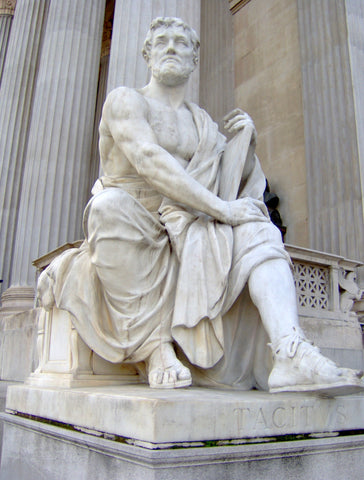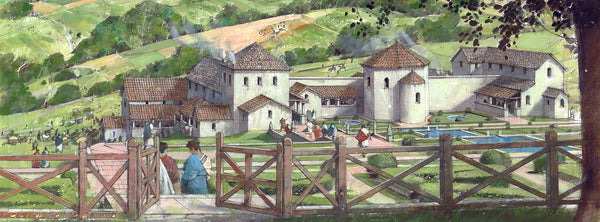
Publius (or Gaius) Cornelius Tacitus, Roman senator and historian, born sometime in the 50's AD, sits outside the Austrian Parliament Building in Vienna.
On a recent episode of the 1 Player Podcast, they discussed wargames in general, and my solitaire design Agricola, Master of Britain in particular. One of the gents on the program mentioned that pretty much everything we know about Agricola's life and campaigns comes to us from Tacitus, his son-in-law. We know very little about the indigenous peoples of Britain during the same period - only what Tacitus tells us, much of which is suspect. (For example, he tells us that the Silures were Iberian transplants, as he thought that Spain was just a quick swim away.) The fellow said that the game was very much from the Roman viewpoint, and that it took the view that Roman conquest and cultural imperialism was good for the uncivilized tribesmen.
And he is one hundred percent correct. The game does take that point of view, one that makes sense in the context of the source material and the scope of the game - a single-player entertainment in which the player takes on the role of the Roman governor of Britain. So of course the game is going to measure victory in terms that endorse the Roman worldview.
I think that every wargame can and should have some kind of point of view. It can be something as simple and elegant as emphasizing the importance of supply and deception, as in Rommel in the Desert. Every design chooses some factors to emphasize and others to de-emphasize, and in so doing, it is presenting some point of view. Usually, it's the designer's point of view - what he or she felt was important or crucial to the unfolding of the conflict, or an understanding of the same.

A pastoral scene on a Roman country estate in this reconstruction drawing of Great Witcombe Roman Villa, Gloucestershire © Historic England (illustration by Ivan Lapper)
But sometimes it's not. In the case of Agricola, Master of Britain, the game's point of view is not the same as my point of view. I'm not for cultural imperialism as a general rule, though I think that exposure to new ideas and cultural norms is healthy for any society. In the ancient world especially, kingdoms that were isolated from foreign trade and contact quickly became stagnant, while nations that interacted, traded, and, yes, came into conflict with their neighbors became more advanced technologically, scientifically, and culturally. But I'm veering off onto a tangent.
The point is, I don't necessarily agree with the Roman worldview, but felt that by presenting and emphasizing that worldview that it might create a more immersive thematic experience. I was emboldened in this decision by Twilight Struggle, of all things. As the designers state in the rulebook, that game has "a very definite point of view. Twilight Struggle basically accepts all of the internal logic of the Cold War as true - even those parts of it that are demonstrably false."
